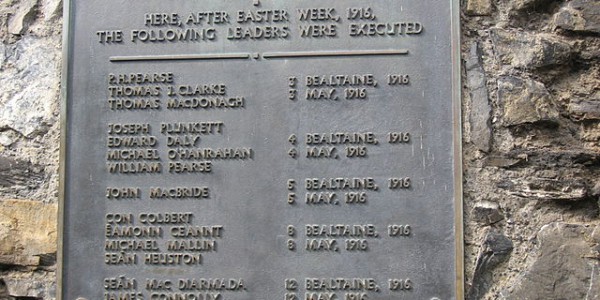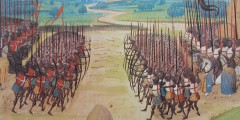Posts by Harry Cocks
Easter Rising Lives: Michael O’Hanrahan
November 2, 2015
Next year will be the 100th anniversary of the Dublin Easter Rising, Conor Kostick Writes. Already, every school in Ireland has been sent a special commemorative flag, and the Arts Council of Ireland has awarded €2m worth of commissions for new art. As well as various parades, there will be hundreds of presentations and discussions …
Agincourt: a Hollow Victory?
October 22, 2015
On October 25th 1415, an English army, on its last legs after a two-week march, inflicted a crushing defeat on the flower of French chivalry near a village in Picardy called Agincourt. Their triumph, the 600th anniversary of which is on Monday, seemed to sum of the indomitable spirit of the English nation: steadfastness, tenacity, …
The Dukeries and the Picturesque in Eighteenth-Century Nottinghamshire
October 20, 2015
In the mid-eighteenth century Horace Walpole described Nottinghamshire as ‘the Dukeries,’ referring to the fact that the county was synonymous with the splendour of its aristocratic landholdings. The most prominent of these were the four parkland estates made by enclosing the moors and waste of Sherwood: Rufford, Newstead, Welbeck and Worksop. Walpole described these compact …
Lessons of History for Political Leaders
September 29, 2015
Successful political leadership has been a key issue in British politics recently, Richard Gaunt writes. Three of the four main political parties in Britain (Labour, the Liberal Democrats and the Scottish Nationalists) have elected new leaders over the course of the past twelve months. Today, the security of tenure of Britain’s political leaders has more …
Visions of Peace on the Eve of the Great War
September 17, 2015
As commemorations marking the centenary of the First World War continue, debates concerning the conflict’s origins have assumed a renewed relevance, Dan Hucker writes. Consensus regarding the causes of war remains elusive but a prevailing view of the pre-1914 era as one animated chiefly by militarism, patriotism, and parochial nationalism remains commonplace. In a recent …
The Pirate Myth: Genealogies of an Imperial concept
September 9, 2015
The English pirate Edward Teach (c 1680-1718, pictured), “assumed the Cognomen of Black-beard, from that large Quantity of Hair, which, like a frightful Meteor, covered his whole Face, and frightened America more than any Comet that has appeared there a long Time” (Charles Johnson, A General History of the Robberies and Murders of the Most …
Climate Change: the Medieval Sources
July 14, 2015
Back in 2009 a team of researchers braved polar bears and arctic storms to set up a small camp in a very remote part of the Greenland Ice Sheet, Conor Kostick writes. Their goal was to drill for a new ice-core and they were successful, setting a record for the depth that they achieved in …
Conservatism: A Philosophy of Inequality?
July 10, 2015
Conservatism is often described as a philosophy of inequality, Dean Blackburn writes. Whereas socialists and social democrats are concerned, above all else, with achieving egalitarian objectives, conservatives, it is argued, are committed to preserving disparities of wealth and status. In a recent article, which has been published by Political Studies (see link below), I challenge …
The Man-Eating Wolves of Renaissance Italy
May 5, 2015
In 1516, the town of Varese Ligure in north-eastern Italy experienced an “invasion of wolves.” Antonio Cesena (b. 1507), a local canon and historian, recorded in his Relatio dell’origine et successi della Terra di Varese (c 1550s) that “a great fear arose about wolves [that] began a new and unaccustomed war, not against herds and …
Chaucer and the Merchant
April 7, 2015
“Whan that Aprill with his shoures soote, The droghte of March hath perced to the roote…Thanne longen folk to goon pilgrimages.” So begins Geoffrey Chaucer’s immortal Canterbury Tales (c.1387-1400). One of those on Chaucer’s famous journey was an unnamed merchant, “with a forking beard, And motley [a patterned fabric] dress,” wearing a Flemish beaver hat …




Recent Comments